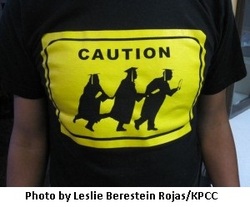
On the other hand, this form of self-revelation can be cathartic and possibly beneficial. Counterintuitively, the first step from darkness could also set the stage for actions under current law that may well lead the federal government to grant legal benefits and protections unavailable to other DREAMers who remain in the shadows. Some of these avenues are described in a useful 73-page online resource, "The Life after College Guide for Undocumented Students," published by the nonprofit, Educators for Fair Consideration (E4FC).
Funded in part by benefactors from Silicon Valley, E4FC suggests, for example, the possibility of seeking employer sponsorship for an H-1B visa (for Specialty Occupation Workers), traveling abroad and applying for a "D3" waiver under Immigration and Nationality Act (INA) § 212(d)(3). This is a risky proposition. It requires throwing oneself on the mercy of both a U.S. consular officer (who must recommend the D3 waiver) and the Department of Homeland Security's Admissibility Review Office (ARO) -- a unit of U.S. Customs and Border Protection -- which must approve it. If the waiver is not granted, a DREAMer who'd entered illegally or been in the U.S. in unlawful presence after age 18 would be subject in most cases to a ten-year bar on reentry to the United States.
The E4FC guide also discusses various legal ways of earning a living in the U.S. notwithstanding undocumented status, such as qualifying as an independent contractor, either as a sole proprietor or an incorporated entity. Although E4FC does not cite legal authority, it exists in some situations under Bhakta v. INS, 667 F.2d 771 (1981); Lauvik v. INS, 910 F.2d 658 (1990); and Konishi v. INS, 661 F.2d 818 (1981), cases holding that management of a business which will likely create jobs for American workers does not constitute unauthorized employment under the immigration laws.
The guide, quite correctly however, cautions DREAMers:
It is your responsibility to determine whether you may legally pursue these options based on your immigration status. Be sure to consult with an experienced immigration lawyer first.
The E4FC, also laudably, provides links to a free, online service gain a preliminary assessment of whether legal remedies may exist in a particular individual's unique situation, offering the admonition:
This service should only be used for a preliminary analysis of your possible immigration remedies. We urge you to consult with a reliable immigration attorney for a comprehensive analysis.
I echo the same cautionary note as E4FC with a disclaimer here, and a reminder that what I am about to suggest is made available for educational purposes only, not to provide specific legal advice. For legal advice in each individual's case, DREAMers should consult a competent immigration lawyer, as urged by U.S.Citizenship and Immigration Services (USCIS) here and as explained by the American Immigration Lawyers Association in this FAQ.
With the foregoing very large caveat, here are some additional tips, possible options and information for further research with and through your immigration lawyer that may be helpful and suitable in a given case (yet may fail miserably in other cases).
- Build Your Tribe. No DREAMer should face the federal government alone. Besides a competent immigration lawyer, your tribe of supporters and resource providers should include, whenever possible, family, friends, fellow students, community activists, faith-based groups working for social justice, wealthy benefactors, an employer willing to sponsor you for a work visa, social media mavens and sympathetic journalists to tell your story to the public and follow you through the immigration process. Though the government may deny that publicity has any effect on their actions, publicity helps. Paraphrasing Hillary Clinton (even if she didn't say it first or quite this way), "it takes a village to raise a [DREAM] child."
- Qualify for family-based, employer-based or self-sponsored immigrant visa classification, and apply for permanent residence (a green card) through adjustment of status by invoking the law's forgiveness provisions. The immigration laws allow foreign citizens to obtain "immigrant visa classification" in many different ways. It can be obtained through certain forms of family or marital sponsorship, or through the employment-based visa categories, including a current or prospective employer's labor certification, as well as through self-sponsorship options under the "Extraordinary Ability" and "National Interest Waiver" avenues. It can even be obtained by way of the EB-5 employment-creation investor category (say, if a wealthy benefactor provides a lawful gift, or a venture capitalist provides funds for investment by purchasing a DREAMer's intellectual property, valued at least a half million dollars). Immigrant visa classification can be converted into a green card through the adjustment of status (AOS) process without ever departing the United States. As an initial prerequisite, AOS requires that the applicant have been inspected and "admitted or paroled." Thus, a DREAMer who entered on a visa but overstayed satisfies this preliminary threshold. If the DREAMer is an EWI (someone who entered without inspection), s/he would need to ask USCIS to grant Parole In Place to satisfy this first step for AOS eligibility. Ordinarily, however, AOS is not available to someone who violated status or worked without permission. Fortunately, there are two exceptions (forgiveness clauses) under which USCIS can still grant AOS: (1) If the violation of status was for "technical reasons;" or (2) if it was other than through the fault of the applicant. See my co-authored article, "Imagining the Improbable: Extraordinary Immigration Solutions for the Hapless and Hopeless." ("Imagining the Improbable"). With the help of an experienced immigration lawyer, more than a few talented and accomplished DREAMers can conceivably present a well-proven case showing that their violation of immigration status was proximately caused by the person(s) who brought them here, or through "technical reasons," e.g., their inability as minors under law to have the legal capacity or capability to take steps to seek some form of lawful status or discretionary relief under law.
- Seek Lawful Nonimmigrant Status without leaving the United States. Just as the green card AOS procedure contains forgiveness clauses, so too do the nonimmigrant visa categories. As explained in Imagining the Improbable, someone who entered on a visa but overstayed or fell out of status, but who did not work without permission and who is not in removal proceedings, may be restored to the same or a different nonimmigrant visa status if "extraordinary circumstances" can be established. Extraordinary circumstances are decided on a case-by-case basis. As Imagining the Improbable also explains, it may be possible, in addition, to rely on a principle of law known as "equitable tolling" to extend the deadline for filing an extension or change of status. Even a person who came into the U.S. as an EWI may qualify if USCIS can first be persuaded to grant Parole In Place. INS (and USCIS still today) have exercised authority to convert parole status into H-1B status on the strength of a March 25, 2000 Headquarters policy memorandum. Thus, conceptually there is no apparent reason why parole-conversion-to-nonimmigrant-status could not also apply to other nonimmigrant categories once Parole In Place is granted.

(A) the likelihood of ultimately removing the alien, including:
(1) the likelihood that the alien will depart without formal proceedings (e.g., minor child who will accompany deportable parents);
(2) the age or physical condition affecting ability to travel;
(3) the likelihood that another country will accept the alien;
(4) the likelihood that the aliens will be able to qualify for some form of relief which would prevent or indefinitely delay deportation;
(B) the presence of sympathetic factors which, while not legally precluding deportation, could lead to unduly protracted deportation proceedings, and which, because of a desire on the part of the administrative authorities or the courts to reach a favorable result, could result in a distortion of the law with unfavorable implications for future cases;
(C) the likelihood that because of the sympathetic factors in the case, a large amount of adverse publicity will be generated which will result in a disproportionate amount of Service time being spent in responding to such publicity or justifying actions (emphasis added);
(D) whether or not the individual is a member of a class of deportable aliens whose removal has been given a high enforcement priority (e.g., dangerous criminals, large-scale alien smugglers, narcotic drug traffickers, terrorists, war criminals, habitual immigration violators).
* * *
To be sure, some seasoned immigration lawyers might react to my suggestions with skepticism. So be it. My purpose is not to suggest that the immigration benefits available under current law through these strategies are easily won.

If large numbers of self-outed DREAMers were to ask for immigration benefits under current law, the bureaucrats managing and administering the immigration laws would be forced to take the flood of well-publicized filings into account and resolve them. Just like the plea-bargaining that takes place in every court of the land, where it would crash the system if every defendant exercised the right to a trial, it would shake the unresponsive immigration system into action were the DREAMers -- in large numbers -- to ask for what the law clearly allows.
So DREAMers (after consulting with your immigration lawyers and acting only on advice of counsel), stop playing hide and seek. Instead, come out, come out, wherever you are.

 RSS Feed
RSS Feed
